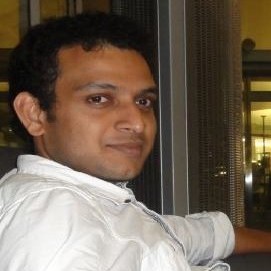We have gotten into the habit of thinking deeper about one topic on a weekly basis. We pick topics based on anything interesting we read - so the topics can range from 'how to express the value of testing' to 'Dieter Rams' design principles' to 'effective remote work habits'. Employees are guided to spend no more than one hour researching the topic online. The emphasis is on coming up with their own ideas and interpretations. We then meet as a group to exchange ideas. I love this habit and consider it one of the more unique benefits you will enjoy at Qxf2.

20-Dec-2016
This article presents an idea on how to manage your career.


Arun
This article presents one idea of how to manage your career. I agree (to a large extent) with the three major points:
1. Your career depends on you and not your employer: Almost any company we join gives us opportunities to learn new things - at least in the beginning. There is a good economic incentive for that. Combine it with the habit of jumping jobs every so often, I think we naturally end up learning ... at least until our skills are relevant in the market and we can still jump jobs. I think, at least in testing, the learning rate drops off drastically after year 3 and many careers end up stagnating. So the point about constant learning is relevant to our field.
2. Managing your career is a better bet over managing other's perception of your career I agree with the author - managing your own career is the safer bet in the long run.
3. Mistakes are a good way to learn Qxf2 isn't going to be your last employer. Heck! I don't even know if Qxf2 is going to be my (founder here) last employer. So when you make a mistake, focus on correcting it and being open about it. Don't waste too much energy trying to cover it up.
A couple of things I want to explicitly point out. One, learning does not have to be limited to technology. Handling social situations, understanding market trends, developing the ability to articulate your positions, branching out and learning other fields, navigating through a political system, etc. are all an essential part of learning. Two, you obviously do not need to keep learning. If you are satisfied with a steady job and not very ambitious about your professional life - that is a totally fine choice too. Just make sure you are in right company that allows for it.
PS: Eric Sink is a big name in the micro independent software vendor circles. I also liked reading 'Business of software'.

Avinash
I liked this article a lot. Agree with Eric that we come to believe that the important thing is not our actual cluefulness but rather the degree to which others perceive us as clue full. That's one of the reason we tend to hide our mistakes and not tend to learn from it. We should perceive learning to be a process, not an event. The most important learning experiences in day-to-day work are the opportunities to learn from our mistakes. Quite often, the reason we don't learn from a mistake is because we're too busy trying to hide it.

Annapoorani
Author, he tells the basic equation for our career. He mentioned that we can't control some of the factors in our career and some we can. And also he specifies learning should be the process, not an event. Learning interest should come from their own interest, it shouldn't be for the compulsion. The most important learning experiences in our day-to-day work are the opportunities to learn from our mistakes. Instead of learning from mistakes we are trying to hide it, because we assume people are going to judge us by seeing our mistakes. But if we do the mistakes continuously and could not find out how to process the mistakes in a positive way then we are not learning anything.

Shiva
I liked the way in which Eric emphasized learning in this article- using a linear equation to explain how learning helps improve someone's career. I also like what he says about Seizing Your Mistakes. Mistakes don't have to hide as long as you are able to take something out of it and your employer is lenient enough to let you learn from them. But i am a little skeptical about the idea of not caring about others perception of your learning. It may not be a good idea in most companies in India as they all have a system to review an employee's performance comparing to another.

Raj
It is a very good article by author Eric Sink, he used simple mathematical equation to describe about who is responsible for your life. In the equation 'C' clufulness is the measure of how successful your career is. and 'L' is Learning. It is defined as the rate at which you gain (or lose) cluefulness over time. Learning doesn't end until and unless your interest gets down. He also explained well about mistakes, by each and every mistake we definitely learn something new, but few people will hide the mistake since they feel that what others will think about them. Author gave a clarification that our cluefulness increases by occurring with mistakes and resolving it instead hiding the mistake A - Manage your career. B - Manage others' perceptions of you. Choose A and your career will be outstanding. Choose B and your career will stagnate.

Smitha
It's a well-written article, I wish I had read it earlier in my career. I might have taken some steps that he's mentioned. I can relate it to my career path that I have chosen. I agree that you should focus on Learning, I remember working on my feedback points in order to get the promotion. Learning is a process. There are performance reviews which assist you or guide you. You have to make an effort to make that work positive for you. There will be opportunities or you have to create them so that there is constant learning. You should manage your career and forget managing others' perceptions of you. Constant learning as he calls it is a Risk. Any greater responsibility involves an amount of risk. Sometimes in your work environment, managers don't give you a chance. You will have to assess it if its right to stay or just move away.

Rohan Dudam
It is a very nice article by Eric Sink. It's really good to know about basic career equation in the beginning of a career. Career success is determined by three factors and only one factor we can control. Yes, during initial stages, we learn many things in any company. I agree with the author, managing your career is a better bet over managing other's perception of your career and mistakes are good ways to learn. I observed when I learned something from my mistakes, I remember the solution for a long time. My times, this saved a lot of my time while doing coding. And being open about mistakes or problem with colleagues, give you an opportunity to know different ways of solution. I also agree with Shivahari, as most of the Indian companies have a system to review an employee's performance comparing to another, so being open too much is risky.

Viraj
This is a very nice article that talks about your value throughout the journey in professional life. The cluefulness equation that the author (Eric Sink) gave is very true. We are born with some talent which can not be changed and with a constant rate of that talent when we learn, We have a chance to increase our Cluefulness. Increasing Cluefulness with learning only is like steady and slow but wins the race. Learning from your own mistakes is very good learning factor that you can have for increasing your Cluefulness. You should not be stopped at just learning but you should have the ability to use it on proper time. Dale Carnegie, The writer and lecturer, reminds me a very nice idea for increasing your Cluefulness -- Weekly Review. You should give at least 30 mins every weekend for re-thinking what went good and bad. Write all the things you did. Write all the mistakes you did. Analyse those mistakes in terms of 1) Why did I do mistake 2)What could be the possible best right thing 3) What lessons I should have from those mistakes. These things if done every week or day would maintain your 'L' so string that you will get completely transformed to a person you always dreamed off.
© Qxf2 Services 2013 -